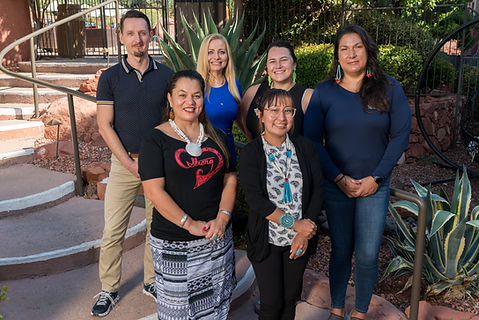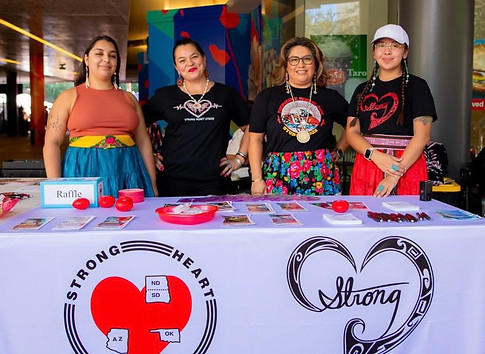
NACP Cervical Cancer Project

NACP Cervical Cancer Project

Did you know that Native American women have the highest rate of Human Papillomavirus, a.k.a. HPV? White, Hispanic, and Native American women have the highest rates of cervical cancer in Arizona, with 8.4 cases per 100,000 women.
Our Story & Purpose
We joined forces with MedStar / Strong Heart Study and NACP because we are committed to finding long term solutions to health disparities facing Native communities.
Our Mission

Paweł Łaniewski, Research Scientist, Celina Garza, Strong Heart Study Coordinator, Melissa Herbst-Kralovetz, Professor and PI, Krystal Charley-Celestino, Postdoctoral Associate, Mary Mohr, Research Scientist, Naomi Lee, Associate Professor and PI
We Welcome You in a Good Way
Your involvement in this study is incredibly valuable. Without your participation, there would be no Native women’s study. We deeply honor and appreciate your willingness to contribute. It is our hope that your participation will provide crucial insights into Native women’s health, particularly in relation to HPV and cervical cancer within urban Native American communities.
Our team is dedicated to conducting culturally relevant and respectful health studies tailored specifically for Native communities. This project is coordinated by Native women, for Native women, and we believe that by working together, we can foster greater empowerment in addressing HPV-related cancers and women’s sexual health.
This study holds great importance to us, and we recognize the sacredness of the information and samples you may provide. To ensure that the questions and methods we use are culturally appropriate and sensitive, we have consulted with Native elders, wisdom keepers, and other Native women. We are committed to asking questions in a way that respects our cultural values and personal experiences.
We understand that participating in this study may bring up strong emotions. Please take your time, ask any questions you may have, and proceed at your own pace. If you need assistance or additional resources, please feel free to reach out to the study coordinator. Your comfort and well-being are our priority, and we are here to support you throughout this process.
Thank you for being a part of this important work.


Celina Mahinalani Garza, Kanaka Maoli
Strong Heart Study Coordinator
Melissa Buffalo, Meskwaki Nation
Chief Executive Officer, American Indian Cancer Foundation
We are looking for Native American women within the age range of 18+ (premenopausal) to join us.
Participates can expect to...
Complete health questionnaire
Provide self-collected vaginal samples using easy instructions in privacy
Participate in 10 visits within two years
Repeat first two steps for a total of ten times of participation
Receive a $25 gift card thru email each time you participate (powered by Tango)
Interested in Participating?
Want to Know More?
Key Components of SHINE
Native Women Led culturally informed protocol developed by in-depth interviews conducted by and with indigenous women. Ensure acceptable methods to facilitate effective participation.
Focus Group Informed questionnaires that participants will complete to inform the research team of sociodemographic, cultural norms, individual and familial health history.
Correlations to Understand relationships between biological factors and socio-cultural components to better understand prevalence of HPV infection and cervical cancer.
Internal Review Board Approved the project at the University of Arizona.

Co-Leaders

University Co-Leads
Drs. Melissa Herbst-Kralovetz, Paweł Łaniewski, and Naomi Lee
View Publications
Arizona Strong Heart Team
Alicia, Celina, Mary, Tanya, Sharon, Sunny, Diane, Nicole, Samantha, Ditas, Roberta, and Cynthia.
View Publications

Topics
HPV / Cervical Cancer
While HPV, human papillomavirus, is the known etiologic agent of cervical cancer, few studies were conducted to estimate HPV prevalence within Native communities. Among those studies, it was reported that 22.2% of Native women from the Hopi reservation tested positive for HPV infection.
Microbiome of the Vaginal Tract
The vaginal microbiome may contribute to the persistence and progression of cervical cancer.
Long-term Commitment
Together we aim to develop a long-term structure to reduce cervical cancer by assessing the vaginal microbiome and HPV longitudinally across all southwest Native American communities.

Story
Our alliance was formed in 2021 as a joint research effort within The Partnership for Native American Cancer Prevention. As biomedical researchers, we have previously partnered with Tribal Nations in health research and community engagement. We have published and more importantly, established committed relationships to sustain long-term solutions in addressing the health disparities facing Indigenous communities in the South West.





